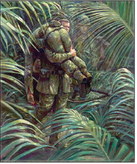VETERANS DAY MONDAY, NOV. 11, 2024
The New Oxford American Dictionary defines veteran as “a person who has served in the military”. Veterans are men and women who have served on active duty in any branch of the US military in times of war and or times of peace.
There are currently six branches of the US Armed Forces: Army, Navy, Marine Corps, Air Force, Coast Guard, and the Space Force. Today, military service is completely voluntary.
In the past a draft has been used to supply our military with the workforce necessary to function. After the Vietnam War the military draft was eliminated, and an all-volunteer military became the norm.
Both men and women can serve as combat soldiers. The common ratio of support troops to combat troops is ten to one. Support troops consist of many skillsets necessary to provide back up for the combat soldier.
Just a few examples are engineers, auto mechanics, aero mechanics, intelligence gatherers, the medical corps, and communication techs.
Each branch recruits individuals and trains them in their fields of need. Some of the trainees serve in the theater of war and some serve at home within the United States.

The United States Armed Forces, both in times of peace and times of war, gives young people an opportunity to serve their country, grow in maturity, and learn leadership and job skills that they might otherwise miss.
Most veterans return to civilian life with a sense of patriotism, pride, as well as benefits that allow for further education, government loans, and respect in their communities.
Of course, enlistment carries risk of injury and death, and it is understood that an enlistee is signing a blank check to the US government upon taking the oath of enlistment.
My role in the US Armed Forces was as a support officer. I enlisted in 1967 in the inactive reserve officers’ corps of the US Army during my junior year of medical school.
My father, a general practice physician in Houston, enlisted at age 36, just after my birth in 1942, in the US Army Medical Corps. He served at Ft. Bliss, in El Paso, until WWII ended in 1945.
My older brother, also a physician, was drafted into the US Army Medical Corps in 1963 and served in Korea. They both encouraged my enlistment.
As fate would have it, the decision paid off, because after completing my internship at Hermann Hospital in Houston in 1969, I was accepted into the ophthalmology residency program at Hermann.
The Army had a deferment program to allow specialty training so that it could fill its needs of the various medical specialties at its Army Hospitals. I received this deferment, and my tour of active duty was postponed until my training was complete and I entered the Army Medical Corps as an ophthalmologist rather than a general medical officer.
My entire tour was spent at Ft Huachuca, Arizona at Raymond Bliss Army Hospital, from July 1972 to 1974.
Upon receiving an honorable discharge, I returned to Texas with my wife and 2-year-old daughter to join the Youens Eye Clinic in Columbus Texas. I never gave much thought to considering myself as a veteran.
Our practice thrived and grew, as did my family.
By 1979, my wife and I had a daughter, and two sons. In 2005 I retired from the eye clinic and began enjoying travel, and several other creative hobbies.
It wasn’t unti l 2017, at age 75, that I was approached by local vets who were starting a Vietnam Veterans of America chapter in Columbus and invited to come to a meeting. I immediately connected with these individuals and joined VVA Chapter 1127.
I was appointed historian and photographer of the chapter. Many of the combat vets sat down with me and told me of their experiences which I wrote as articles and submitted to the Citizen. Our activities presently include participating in local parades, providing color guards for special events, performing flag folding ceremonies at veteran funerals, and fundraisers through golf tournaments and clay shoots that allows us to give scholarships to CHS seniors.
I have come to understand how important veteran organizations are to a community. They provide a brotherhood for those who have served and promoted patriotism and love of country.
When the VVA dies of attrition new groups of Persian Gulf War, Afghanistan, and Iraq vets will sprout and carry on the tradition.
.jpg)
